February 20, 2012
DOMA complicates gay divorces
Kevin Mark Kline READ TIME: 6 MIN.
The federal ban against same-sex marriages not only throws up roadblocks for LGBT couples wishing to wed. It also complicates their divorce proceedings when the relationship sours.
With a number of states allowing same-sex couples to marry - Washington being the most recent - and even more sanctioning domestic partnerships or civil unions, the fact that the federal government treats such relationships differently than heterosexual marriages is often overlooked during times of bliss.
But a clerical error in a San Francisco lesbian couple's divorce proceeding illustrates how the Defense of Marriage Act continues to unfairly burden gay and lesbian couples.
The case involves Lisa Chun and Esther Lee, who had been together since 1998 and have two young sons. They registered as domestic partners with the state of California in 1999 and, in 2003, the two married in Vancouver, Canada.
Last September Chun moved to end the relationship, and the dissolution of their partnership has proved to be bitterly fought. A contentious hearing was held December 11 before San Francisco Superior Court Judge Monica Wiley over the payment of child and spousal support.
It dragged on beyond the expected 20 minutes that had been allotted. Rushed for time, Wiley inadvertently calculated the amount of spousal support as if the women were a straight married couple instead of using the formula for registered domestic partners. It also appears the judge incorrectly classified Chun's various sources of revenue for federal tax purposes.
The errors, if not fixed, could have negative tax implications for the two women, as the Internal Revenue Service does not treat them the same as it would a heterosexual couple due to DOMA.
"The court's support calculation contains two errors that make a significant difference in the amount of child and spousal support payable by Lisa to Esther," Chun's attorney, Andrea Palash, wrote in a motion requesting that the judge recalculate what Lee is owed based on the mathematical formula used for same-sex domestic partners.
In an interview this week Palash said had there been more time she thinks the mistake could have been corrected during the court proceeding last year.
"This is the first time I have ever had a contested support motion in a same-sex case," said Palash.
She added that Chun is not trying to avoid her legal obligations.
"It is not my client didn't want to pay support, she just wanted to pay the correct amount," said Palash, who added she hopes the matter can be resolved between the parties.
Several attorneys contacted by the Bay Area Reporter said it appears the judge made a simple error.
"It looks like a mistake that would be easy for a judge to make if rushed and pushed the wrong button," said Jennifer C. Pizer, the legal director and Arnold D. Kassoy senior scholar of law at UCLA's Williams Institute on Sexual Orientation Law and Public Policy.
Patricia Cain, a professor who teaches sexuality law at Santa Clara University School of Law and is an expert on DOMA, agreed.
"The judge got it wrong here," said Cain. "The judge approved an order that calculated too high an alimony payment."
Because of how the IRS treats same-sex couples due to DOMA, it is normal practice in California for judges to require less spousal support to be paid in a gay divorce in order to compensate for the difference in tax deductions same-sex couples can seek, explained Pizer.
"What California family courts usually do is they lessen the amount of support a payor would pay because they understand she won't get a deduction. She has to pay tax on that money," said Pizer. "The recipient of the money, in this instance Esther, has to pay income tax because she is receiving income."
If the calculation isn't revised, said Pizer, "there is a risk here that the IRS would require both to pay tax."
>Complicated proceedings
The case illustrates why many attorneys who specialize in family law counsel LGBT clients who are divorcing or dissolving their domestic partnerships that it is in their best interest to do so amicably.
"Given that DOMA denies same-gender couples the options straight people have to organize our finances when divorcing, it provides even more incentive for same-gender couples to work cooperatively in our divorces," attorney Charlie Spiegel, who helped organize a Valentine's Day talk for fellow divorce lawyers about federal tax implications in gay divorces, told the Bay Area Reporter. "Minimize the money we send to Uncle Sam and have more to divide within the couple and provide for our families' support."
Because California family law over the years has been updated to grant the same rights and responsibilities married couples receive to domestic partners, many LGBT couples may assume the same is true when it comes to divorces, which are handled by state courts.
"People who are married, even of the same sex, think they are married. They tend to ignore DOMA or don't know how DOMA applies," said Cain. "DOMA has nothing to do with child custody or parenthood status under state law. It has everything to do with federal income tax when you have a statute that uses the word spouse."
Couples can be surprised to learn that due to the restrictions DOMA places on the IRS, the anti-gay federal law complicates their divorce proceedings.
"You may not be getting certain federal tax treatment because of DOMA. That may affect a number of things for the couple that California law really can't do anything about," said Jon W. Davidson, the legal director at Lambda Legal Defense and Education Fund. "I think most people are not going to fully understand how they deal with it. It is more complicated."
The fact that Palash cited DOMA in the petition she filed with the superior court seeking to correct the judge's mistake has brought the issue into the forefront. It also has caught the attention of other attorneys who specialize in family law and work with LGBT spouses.
"To me the take-away from this is this is why same-gender couples have to work harder and more cooperatively together because of the potential for these kinds of mistakes," said Spiegel.
A group of fellow attorneys he meets with regularly last week discussed the petition that mentioned DOMA, said Spiegel. Part of the debate centered around if it was necessary to cite DOMA considering LGBT legal groups, in a set of community standards created to address custody disputes in LGBT families, advise lawyers not to "take advantage" of anti-gay laws.
"It is a rare set of facts because it was triggered by something that was essentially inadvertent. We are used to DOMA coming up in so many other contexts so this is an unusual one it has come up in," said Spiegel.
Palash said she included DOMA in her motion because it is germane to the argument she is making on why the spousal support needs to be recalculated.
"I wasn't thrilled about having to file a motion but it happens," she said. "I wanted to lay it all out for the judge. Here is what you can do and why."
Having worked on marriage equality issues over the years, Lee told the B.A.R. that she was stunned when she saw DOMA brought up in her divorce proceedings. Even though her attorney has advised her that the judge made an error, Lee said it does not lessen the hurt she felt in seeing the anti-gay law be referenced.
"The federal government is hampering my ability to provide for my family right now," said Lee. "I don't completely understand how in one sense we have reached the other side of the rainbow, but when it comes to married life, we hit this barbed wire fence."
If anything, said Lee, the situation has reinvigorated the activist in her. She said she wants to re-engage in efforts to repeal DOMA.
"We don't have the right to love equally under the law," said Lee, who helped launch the Equality Federation focused on strengthening statewide LGBT groups. "I am not a lawyer. If I see a law I don't like, I am going to change that law. I have always fought the good fight."
Los Angeles attorney Roberta Bennet, a nationally recognized expert on LGBT family law, declined to comment about the DOMA citation in the local case. But she did say it appears the judge erred and that the case demonstrates how complicated LGBT divorces can be.
"Yes the court miscalculated spousal support," Bennet wrote in an emailed response to the B.A.R. "Yes, a legally married same sex couple or CA Registered Domestic Partner paying spousal support cannot deduct said payments on his/her tax returns. Yes, these spousal support payments can be deducted on CA tax returns. Messy? You bet!"






